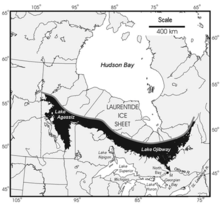Lake Ojibway
Lake Ojibway ice reservoir was a prehistoric lake in what is now northern Ontario and Quebec in Canada and the last of the great ice reservoirs of the last ice age . It reached its greatest extent around 8,500 years ago.
background
The Ojibway Ice Reservoir was relatively short-lived. The lake emptied into Hudson Bay in a mega- flood about 8,200 years ago, possibly due to an ice dam or a glacier run . The resulting lowering of the salt content and the associated interruption of the thermohaline circulation could be related to the so-called misox fluctuation , a relatively short-term climate change around 8,200 years ago.
Individual evidence
- ↑ Patrick Lajeunesse, Guillaume St-Onge: The subglacial origin of the Lake Agassiz – Ojibway final outburst flood. In: Nature Geoscience. 1, 2008, pp. 184-188, doi : 10.1038 / ngeo130 .
